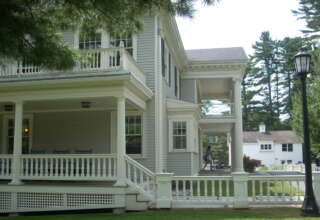
The Victorian mansion holds another important property. It is designed for visiting people. There is a parlor where people come to visit and where extended conversations are expected. Though Victorian mansions are large and expensive, they are built next to one another, often with very little intervening space. Neighbors interact and an enduring community is present—in part because people don’t move around very much, thus providing both the motivation and continuity for building a strong community. Unlike the “life style enclaves” that Bellah identifies with the new American community, the old British communities are based not on shared interest, but rather on shared social-economic class. People live in communities made up of other people from the same class—hence, the assumption of shared values and perspectives (the third ingredient of trust). Thus, while the British society is community-based, this base is very conservative in nature and not very conducive to movement across class structures. As in the case of many other traditional class-based societies in our world, British community comes at the expense of social mobility and equity of treatment and opportunity—and at the expense of individual initiative and achievement.
The British school picks up the motifs of the Victorian mansion and British society. This school focuses on the complexity and many tiered dynamics of interpersonal relationships. What you see is not necessarily (and usually isn’t) what you get. Interpersonal relationships are filled with attics, cellars, hidden rooms and dimly lit hallways. There are many relics from old (no longer remembered) times, and there is a prevailing sense that one has not really gotten to know the relationship or mansion even after spending some time in the parlor. Ample opportunity is provided, however, for getting to know the other person more fully. Time is always available, and an eternity is waiting for rich and complex mutual understanding to take place.
The British school also embraces the British society’s emphasis on collective identity—as well as its conservative predilections and hesitancy about embracing change. The British school focuses on the group and community, rather than the individual. Groups have a reality. Each group has its own purposes and dynamic; furthermore, these purposes and dynamics are something more than the composite of interwoven interpersonal interactions and co-dependencies. One can speak about group behavior in a workshop conducted by a British school facilitator. In fact, the notion that one acts independently of group dynamics is considered to be naïve, at best, and often is considered to be a clear indication that one is acting out the myth of autonomous action for the group. This assignment of an autonomy role is intended by the group to help its members collectively to achieve some tacitly held or unconscious goal—such as the avoidance of collective responsibility.









